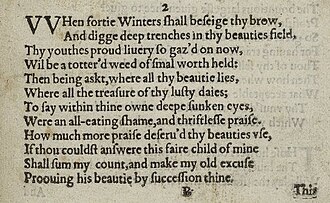Sonnet 2
Q1
Q2
Q3
C
When forty winters shall besiege thy brow
And dig deep trenches in thy beauty’s field,
Thy youth’s proud livery, so gaz’d on now,
Will be a tatter’d weed, of small worth held:
Then being ask’d where all thy beauty lies,
Where all the treasure of thy lusty days,
To say, within thine own deep-sunken eyes,
Were an all-eating shame and thriftless praise.
How much more praise deserv’d thy beauty’s use,
If thou couldst answer “This fair child of mine
Shall sum my count and make my old excuse,”
Proving his beauty by succession thine!
This were to be new made when thou art old,
And see thy blood warm when thou feel’st it cold.
4
8
12
14
Sonnet 2 is one of 154 sonnets written by the English playwright and poet William Shakespeare. It is a procreation sonnet within the Fair Youth sequence.
When forty winters shall besiege thy brow,
And dig deep trenches in thy beauty's field,
Thy youth's proud livery, so gazed on now,
Will be a tatter'd weed, of small worth held:
Then being ask'd where all thy beauty lies,
Where all the treasure of thy lusty days,
To say, within thine own deep-sunken eyes,
Were an all-eating shame and thriftless praise.
How much more praise deserved thy beauty's use,
If thou couldst answer 'This fair child of mine
Shall sum my count and make my old excuse,
Proving his beauty by succession thine!
This were to be new made when thou art old,
And see thy blood warm when thou feel'st it cold.
Sonnet 2 is an English or Shakespearean sonnet, which consists of three quatrains followed by a couplet. It follows the form's typical rhyme scheme: abab cdcd efef gg. Like all but one sonnet in the sequence, it is written in iambic pentameter, a type of poetic metre based on five pairs of metrically weak/strong syllabic positions:
...
Wikipedia

